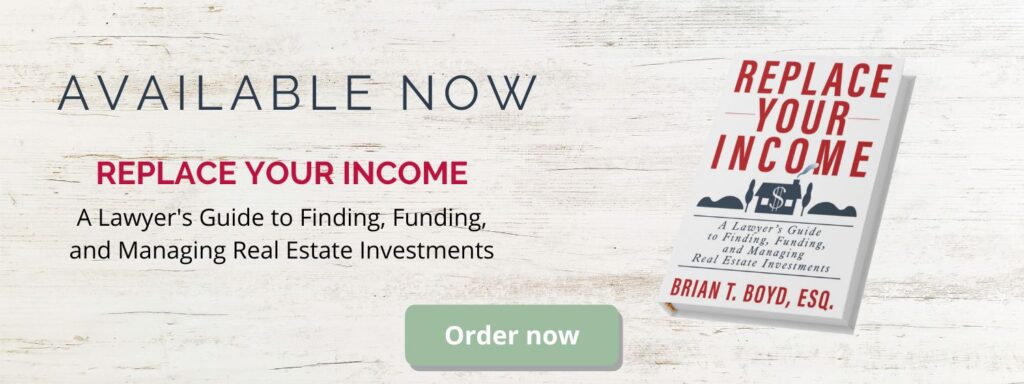Real estate investing is a fantastic way to replace your income, build your wealth, and build financial independence, yet many hesitate to jump in and get started. Here are some of the common questions I am asked, along with tips on how you too, can take advantage of this opportunity.
What are some of the pros and cons of investing in real estate?
Investing in real estate can have many benefits, but it also comes with some potential drawbacks. Here are a few pros and cons to consider:
Pros:
- Potential for steady income streams through rental income and property appreciation.
- Real estate investments can provide diversification to your investment portfolio.
- Real estate has proven to be a good hedge against inflation over time.
- Tax benefits, such as deductions for mortgage interest, property taxes, and depreciation.
Cons:
- Real estate investments can require significant capital upfront, making them less accessible to smaller investors.
- Real estate values can be volatile and are subject to market fluctuations.
- Property management can require significant time and effort.
- Real estate investments can also be impacted by government regulations, zoning changes, and local economic conditions.
Overall, investing in real estate can be a lucrative and rewarding endeavor, but it requires careful consideration and planning, therefore you will want to pay attention to what experienced real estate investors have to say in order to save yourself time, money, and potential heartache.
Who should consider investing in real estate?
Real estate can be a viable investment option for a wide range of individuals, depending on their financial goals, resources, and risk tolerance. Here are a few groups of people who might consider investing in real estate:
- High-net-worth individuals who are looking to diversify their portfolios and generate passive income streams.
- Young professionals who have some savings and are interested in building long-term wealth through smart investments.
- Anyone who wants to replace their income from their day job
- Real estate professionals or those with a deep understanding of the industry, who can leverage their expertise to identify promising investment opportunities.
- Retirees or those nearing retirement who want a reliable source of income (e.g. rental income from real estate investments) to supplement their retirement savings.
- Anyone who is interested in owning property and has the financial resources to do so, whether as a full-time landlord, vacation home owner, or some other arrangement.
While real estate can be a lucrative investment option, it is important for investors to carefully assess their financial goals, resources, and risk tolerance before making any decisions.
How much money do you need to invest in real estate?
The amount of money required to invest in real estate can vary widely depending on the type of investment, location, and other factors. Here are a few examples:
- Rental properties: Purchasing a rental property typically requires a down payment of 20-30% of the property’s value, plus closing costs and other fees. Depending on the price of the property and other expenses such as repairs, renovations, and property management, investors may need anywhere from tens of thousands to hundreds of thousands of dollars to get started.
- Real estate investment trusts (REITs): REITs are securities that allow investors to pool their money to invest in a portfolio of real estate assets. Minimum investments in REITs can range from a few hundred dollars to thousands of dollars, depending on the fund.
- Real estate crowdfunding: Crowdfunding platforms allow investors to pool their money to invest in specific real estate projects, such as commercial developments or apartment buildings. The minimum investment amount can vary widely, but it is often in the range of a few thousand dollars.
- Real estate mutual funds: Mutual funds that invest in real estate can be purchased for as little as a few hundred dollars, depending on the fund.
Ultimately, the amount of money required to invest in real estate will depend on a number of factors, including the type of investment, the location, the investor’s goals and risk tolerance, and their available resources.
What are some ways you can easily invest in real estate?
There are several ways to invest in real estate that require varying levels of time, resources, and expertise. Here are a few examples of relatively easy ways to invest in real estate:
- Real estate investment trusts (REITs): REITs are publicly traded companies that own and manage real estate assets, such as apartment buildings, office spaces, and shopping centers. Investors can buy shares in a REIT just like they would buy shares in a stock or mutual fund, allowing them to invest in real estate without having to buy physical property.
- Real estate crowdfunding: Crowdfunding platforms allow investors to invest in specific real estate projects, such as commercial developments or apartment buildings, by pooling their money with other investors. This can be a relatively low-cost and low-risk way to invest in real estate, as investors can participate with as little as a few thousand dollars.
- Real estate mutual funds: Mutual funds that invest in real estate can be purchased through brokers or financial advisors. These funds typically invest in a diversified portfolio of real estate assets, providing investors with exposure to the real estate market without having to manage properties themselves.
- Real estate investment groups (REIGs): REIGs allow investors to pool their money to purchase and manage properties. This can be a good option for investors who want to be involved in real estate investments but don’t have the time, expertise or resources to do it alone.
How should someone decide if real estate investing is a wise decision for them?
When considering whether real estate investing is a wise move, there are several factors that individuals should consider:
- Financial goals: What are your financial goals for investing? Are you looking to build long-term wealth, generate passive income, or diversify your investment portfolio? Real estate can be a good option for achieving these goals, but it is important to ensure that your investing strategy aligns with your goals.
- Resources: How much capital and other resources do you have available for investing in real estate? Investing in real estate typically requires a significant upfront investment, so it is important to ensure that you have the resources available to make the investment.
- Risk tolerance: How comfortable are you with risk? Real estate investments can be subject to market fluctuations and other risks, so it is important to have a clear understanding of your risk tolerance before investing.
- Knowledge and expertise: Do you have the knowledge and expertise necessary to make informed decisions about real estate investments? If not, it may be beneficial to consult with a professional or to conduct additional research to ensure that you are adequately prepared to make investing decisions.
- Market conditions: What are the market conditions in your area and in the real estate industry more broadly? Investing in real estate can be impacted by economic conditions, interest rates, and other factors that may influence the market.
When considering investing in real estate, it is important to do your research and seek professional advice where necessary to ensure that you are making informed decisions about your investments. Replace Your Income: A Lawyer’s Guide to Finding, Funding, and Managing Real Estate Investments by tax attorney Brian T. Boyd is specifically for those thinking about or relatively new to real estate investing.
This article was originally published on The Chicago Journal





